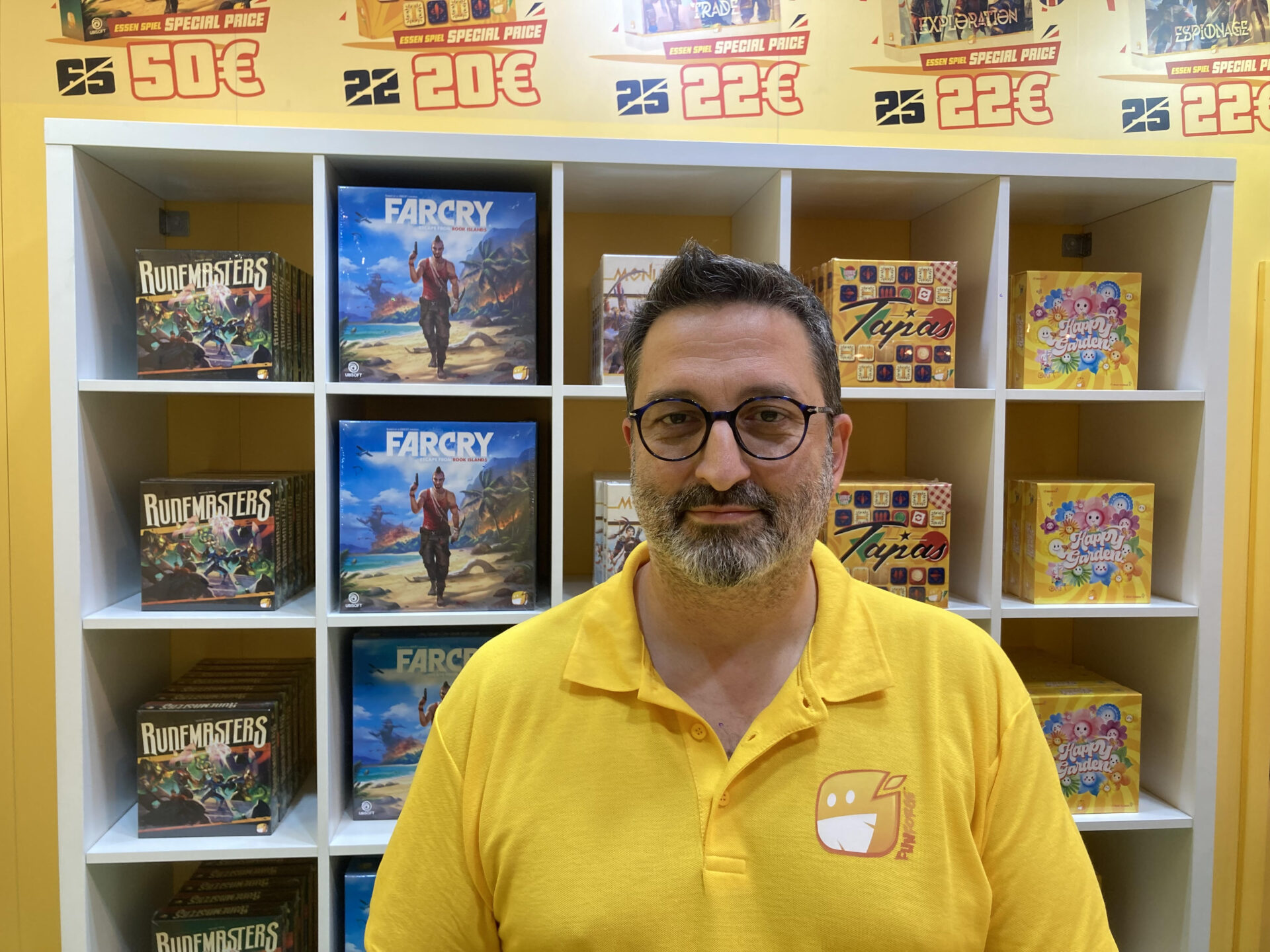
“Did it save the company? Yes and no”: FunForge’s CEO on fighting its financial woes by selling the Tokaido line to Stonemaier
After years of financial struggles, French board game publisher FunForge has taken the drastic step of selling its entire line of Tokaido games to Wingspan publisher Stonemaier Games, in a move it hopes will give the company breathing space to rebuild – and refocus – its business.
BoardGameWire reported at length back in May about FunForge’s woes, after a financial black hole caused by the Covid-19 crisis left it struggling to fulfil its outstanding Kickstarter campaigns.
FunForge committed not to pass on to its Kickstarter backers the more than $250,000 of unexpected costs it racked up during the pandemic amid soaring manufacturing and shipping costs.
But rising criticism of its communications from backers of its most recent Monumental Kickstarter – which was slated to be delivered more than three years ago – led to death threats targeted at FunForge’s staff, and saw the company go silent on its official updates about the game for eight months while it worked to finance a solution.
Many backers believed their copies of Monumental would never arrive – but BoardGameWire revealed in late July that the company was within weeks of signing a contract which would give it the funding to get the heavily-delayed Monumental shipped its backers.
That deal has now been revealed as the sale of Tokaido, Tokaido Duel and Namiji to Stonemaier – a move which has finally allowed Monumental to ship. European backers have been receiving their games since September, and FunForge said it expects all backers to have received their copies by the end of the year.
The deal draws a line under a bleak period for the business, which has laid off half of its formerly eight-strong team since the beginning of the year – but creates a new challenge for the company, having lost a major evergreen line of games from its portfolio.
FunForge CEO Philippe Nouhra sat down with BoardGameWire at this year’s Spiel Essen board game fair to discuss how the company is pivoting to small-box games in an attempt to rebuild financially and creatively, and why board gaming’s broken crowdfunding and distribution models are leading the industry to a looming crisis.
—
BoardGameWire: When did you realize that selling something like the Tokaido series was going to be the solution for the problems that you were facing?
FunForge CEO Philippe Nouhra: It was roughly a year ago. It was a mix of several things: the fact that we had to solve some issues – financial issues, of course, but also in terms of creativity. We are a small team, and we are always aiming toward new projects, new IPs, being creative, refreshing ideas and so on. It’s super cool for a publisher to have an IP like Tokaido, which is really strong and evergreen. And everyone dreams about getting this, but it’s kind of golden cage too, because when you have a product like Tokaido and you are a small team like us, you always have to do Tokaido products, you know, new titles, new items, new something every time, because you want the line to be alive.
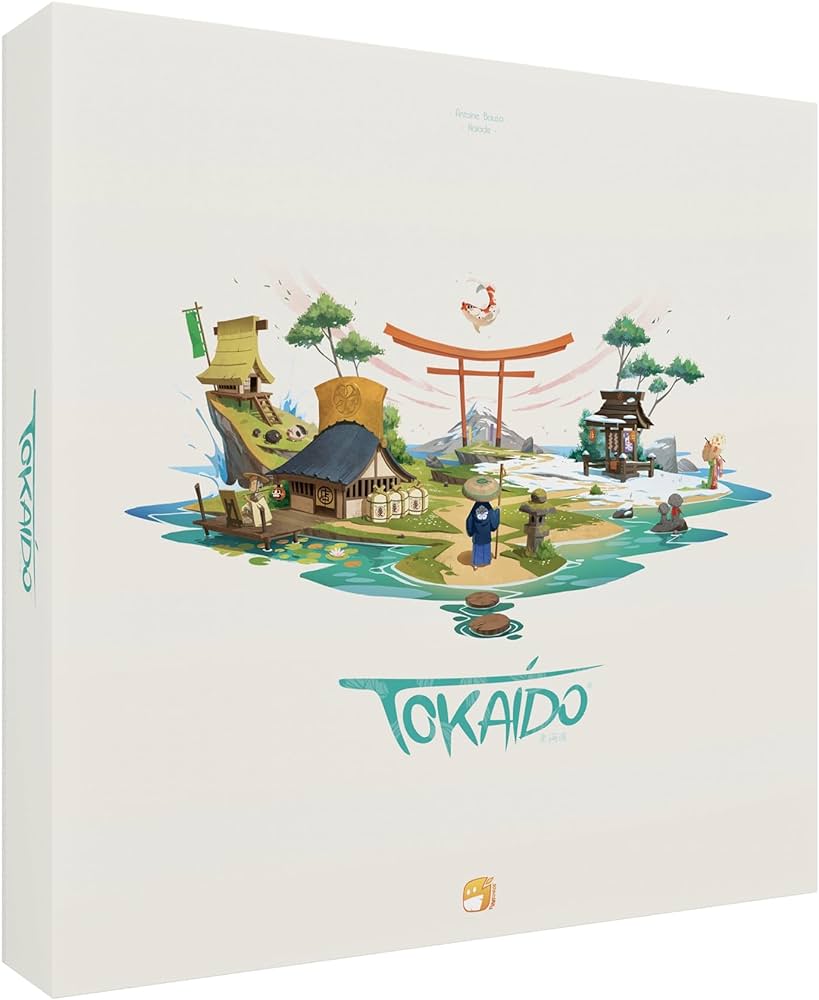
So at some point it was Tokaido, Tokaido, Tokaido, and as I’m also the creative director and the art director of the company, even though I created all the Tokaido line and all this really special graphic look, you know, the white box – which was something quite innovative at the time – but I felt also that I was doing always the same thing, which was kind of annoying at some point. So the conjunction of those two factors, those two thoughts led to: ‘Maybe that’s the right time to do the move’.
Of course, as the original publisher there’s always some kind of mixed feeling about it, because it’s like a baby, but at some point, even when you have a baby, you have to let it leave the home, you know? The main goal here was to find the right partner to it. We didn’t want to just drop the IP everywhere. The main concern was not really about money, it was about the legacy: what will be the legacy of Tokaido after us? We discussed with a lot of people, and then came Stonemaier, and I discussed with Jamey [Stegmaier], who is a great guy, and he was absolutely passionate about Tokaido. So I thought, okay, here is someone that can understand what needs to be done. And plus, on top of this, Stonemaier is a solid publisher, very solid company. And so they were also comfortable with the financial aspects of the transaction. So it turns out that it’s the perfect partner for this, and I’m really happy to see the baby living a new life in a new family, knowing that this is the right one.
As for us, it’s kind of a restart, you know, we are resetting everything – not really, because we have track records, not always good [laughs], but not so bad, neither. As everyone, we did mistakes on the way, but, but we always try to fix them and to be respectful in the end – even though people tend to think that we are not. In these last days they will change their mind, hopefully, now that we are delivering Monumental. So it’s a new start, and we are creating new stuff, and that’s refreshing – also in terms of our mindset. At some point, I just looked at the name and the logo, and I said, ‘Okay, we are called FunForge – it should be more fun to do this’. Tokaido is a great, amazing IP, but it was not the fun I was looking for. So we’ll see, the future would tell us if we were right or wrong. But that’s the way it goes right now.
How many other publishers Did you speak to?
That’s quite confidential, of course [laughs], but roughly something like, I would say maybe six or seven. There’s not so many people that are able to acquire this kind of line, and not all of them were really ready to in fact.
If you hadn’t been able to sell it – if nobody had been able to take it, or you weren’t happy with the publishers that were willing to – where would FunForge be? Where would that have left you?
Well, [laughs] the situation will be worse, that’s for sure! Because for several months now the market is really, really hard and tense, and it turns out that the products that we were working on, were products that were designed at some point in the time – and for us, the time to bring this product to the market was too long, so when the product hit the market, that didn’t fit what the market wanted at this time, so they were too expensive. A product like Far Cry, for instance – which is, by the way, an amazing game. We put a lot of work into this product, probably four years of fine tuning with the rules, but it’s too heavy, too big for retail products.
But it’s a really famous IP, right?
Yeah, it is, but it seems that video games don’t convert a lot into board games. There’s no real overlap of audience between the video game and the board game audience. Initially, this project was intended to be a Kickstarter, and when we thought with Ubisoft about the content of the game, what we thought is that the DNA of Far Cry is to bring a new setting every time. If you look at the Far Cry titles, the setting is changing every time. So we said ‘that would be cool to do this with the board game’, because once again, we want to be creative, you know? And then we created a product that was called Far Cry: Beyond with a really cool setting in the 80s. There’s a lot of flashback stuff, and that was really cool to work on this, and Ubisoft was super pumped about the project.
But when we launched the Kickstarter campaign, we really quickly understood that we made a mistake, in fact, because when you are bringing licensed stuff on the market, people want to get their license. So they want mainly fan service and things that they know. So everyone was asking, ‘Where is Far Cry?’ I mean, beyond the title, there’s no real Far Cry that we know. So we decided immediately to stop the campaign. We said, ‘Okay, we were wrong. We need to work again on the product.’ And then we thought that we had to work with Ubisoft about what was the main iconic title of the Far Cry franchise, and they said it’s obviously Far Cry 3. So we work on this setting, and it led to a Far Cry: Escape From Rook Islands, the game that we are selling right now, but all of this process took too much time, in fact, and so now the market is not ready anymore for this kind of game. So that’s a shame. That’s a pity, but that’s also the reality of life, so we had to deal with it.
Just while we’re talking about this: Cyberpunk 2077: The Board Game has just funded on Gamefound, and raised more than $7m. So it can work? Although that game has a lot of miniatures – do you think with Kickstarter and Gamefound campaigns, games have to be presented in a particular way?
Yeah, I think that this kind of project can only work on these kinds of platforms. Kickstarter or Gamefound, this is the only way. This is the only channel right now, mainly the only channel, for this kind of product, which are so expensive, so huge. Our goal was to hit the retail ultimately, and the retail is not ready anymore. Now, if you have a game that is more than 40 bucks, you know, €35, or something like this, it’s really, really hard to sell it. Distributors are very reluctant to take risk on this kind of products. So that’s why I think these kind of projects are doing so well on the crowdfunding platforms, because this is the way, this is the only place you can find them. But we are just [laughs], we are just so pissed off with Kickstarter that we will not do it again.
Why are you so cross with Kickstarter?
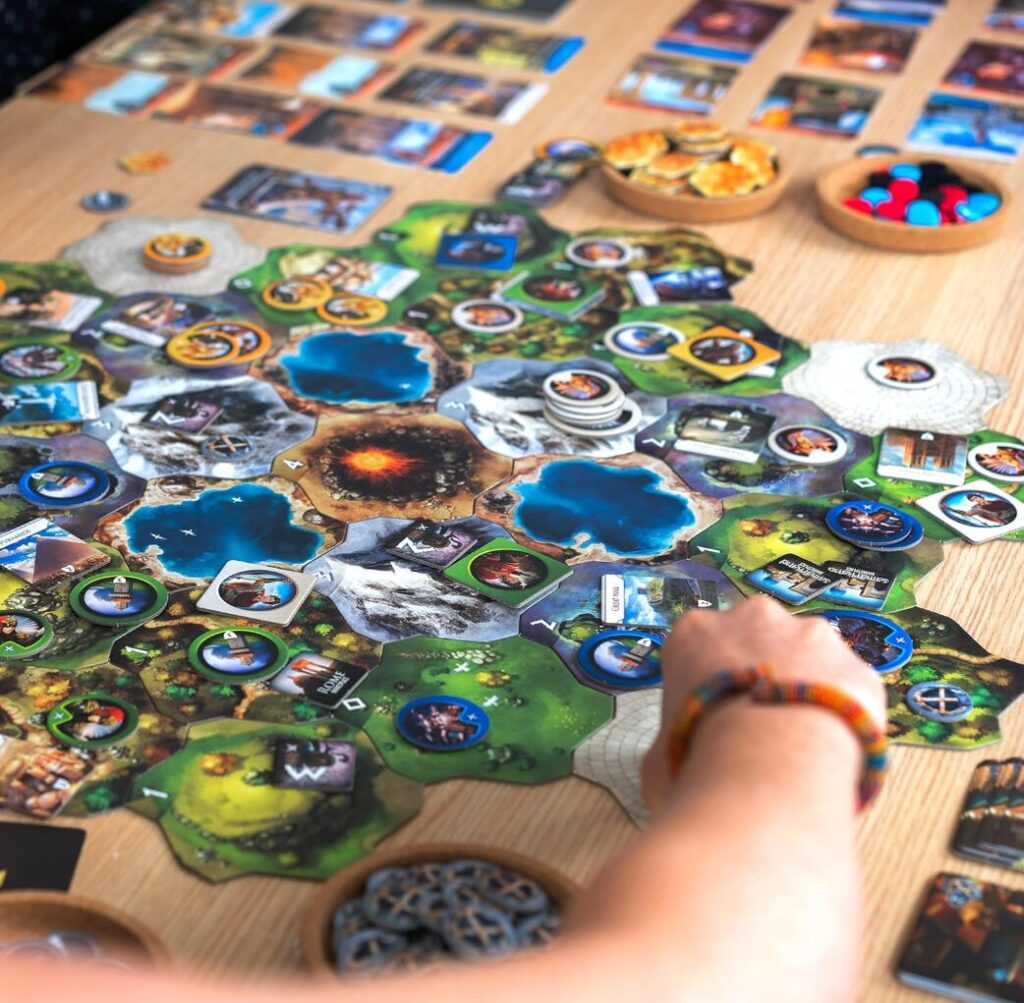
Because of the bad experiences that we got. When we reached out to Kickstarter to put projects on, it was because we mainly needed it, he way we created the project was too ambitious for the regular distribution network, so it worked at that time. But it’s something that I already explained dozens of times, the fact that the last campaign of Monumental was done right at the Covid time, and all the calculations that were behind it was from the world before. And then we were hit hard by Covid, and then a war in Ukraine, and then everything exploded, in fact, on the way. So at some point we lost a lot of money, and everything was produced. Even if people, some people said that, you know, ‘no, they broke, they disappeared. The games are not produced’. Blah, blah, blah, all of this bullshit, because that’s only bullshit.
We had the product produced. But we already lost a lot of money, and we were just short of money to do the last mile shipping, which is super expensive. And I was always reluctant to ask for any more money from the backers, so we had to find a solution to this. It took time, because it’s not easy [laughs], you know, finding hundreds of thousands of euros is not easy. So it took time, but ultimately we did. We managed to do it. And my hope is that the people who burned, for instance, Monumental Duel on BGG with one and two [ratings] and just insulting me personally on those platforms, will remove these things, and give us a bit of credit back, you know, for having fulfilled in the end. Even with a lot of late[ness], which, once again, I can understand why people were pissed off by the late[ness] but it was not totally on us at this point. So we did our best. It was not the best, but we did our best, and in the end, we did it.
Do you regret, in hindsight, not doing more on the communication side with backers, especially because, as you say…
In fact, we did a lot.
…but there was a bit of a vacuum, and conspiracy theories filled it.
Yeah, in fact, we did a lot. We really did a lot. If you look at the number of updates that we did, that’s crazy. And at some point we understood that even doing a lot of updates, we were just not heard anymore, because people were starting to be pissed off by the late[ness]. So they said, ‘Okay, this is the time where you became a liar’. You know? They said, ‘No, they are lying. They are lying. They are lying.’ And at some point we understood that just that, you know, that’s funny – because people want you to communicate, but when you communicate, they say, ‘No, you’re lying.’ So it doesn’t give you real motivation to keep on communicating with people, when you are talking to someone who is insulting you back, you don’t want to speak with them anymore.
So our mindset at that at that time, was okay, we will just work on finding solutions, and when we will have concrete solutions, we will tell people we have concrete solutions, and that’s the reason of the vacuum. But at some point, people need also to understand that their reaction, is the reaction that is creating this vacuum, you know? When two people are talking together, there’s two people, and everyone has consequences on the other one. So it’s not because you are the customer that you are allowed to, you know… we received messages that were crazy, illegal ones really. Charlotte, who was our head of communication, received personal messages through it, death threats, things like this. Hey people, we’re just dealing with board games, okay? We are not delivering a kidney to you – it’s a board game, relax. In a way, I understand the frustration, but I cannot accept the way it was expressed, you know. So hopefully this will be behind us soon, and it is already in Europe. It will be in roughly a week or 10 days in the US. UK and Australia, New Zealand, are on their way too, so by the end of the year everything will be delivered, and people will see that they have received a quality product and a great game. So that’s what counts in the end, I think.
The Tokaido deal: has that saved the company?
Has it saved the company? Yes and no. Yes, it saved the company because it allowed us to clean everything, but for reasons that are outside of our scope, mainly bankers, who are really people that I don’t consider a lot [laughs], especially nowadays, they did everything as possible to be as greedy as possible and to get things that there shouldn’t be a lot to get. So they get the credit line back earlier, this kind of stuff. So let’s say that the horizon is a bit too near for my taste [laughs]. So yes, it saved the company, but we are not in a super comfortable situation. So my goal right now is to clean everything so that no customer is upset – of course, there will always be people that are upset – but that everything is clean and we are okay to start again with the future. We always, always fight – the mojo and the motto of the company is never give up, never surrender, you know? Whatever the situation, whatever the difficulties, whatever the obstacles. So I’m always optimistic [laughs]. You need to be.
In terms of future strategy – I’m looking at the games that are on the shelf behind you: Happy Garden, Tapas – is smaller boxes the way forwards for you now?
For the moment, yeah, this is what the market wants. And we see with all the discussions we have with our distribution partners worldwide, they all say the price point is perfect. So yes, for the moment, we are focusing on these kind of products. The goal is not to do just small games, we want to do small games with a lot of content. So if you look at Monumental Duel, it’s heavily packed with content. Even Happy Garden, which seems light – it’s a lighter game, that’s true, but it has incredible qualities as it is a super mainstream game, but with enough depth in the mechanic – because it’s a tile placement and combo mechanic – that it is also appealing to enthusiast gamers and players. So we are looking for the moment toward these kind of products.
Of course there’s also the Monumental line, the big line, the classic boxes. All of this will depend on the life of Monumental Duel, and we have a lot of projects behind it. We are really proud of what the products are. So this is what we’re working on right now, but more on the Monumental Duel line right now than on the big boxes, because they are also expensive, and on the line of the abstract games like Tapas, which is one of our new releases. It’s the second one following donuts. We created a kind of market segment with pure abstract games with a theme, which creates a line. So we want to create a line of ‘foodies’ games like this – and at some point, you know, the all you can eat formula, yes, that you can have everything [laughs]. So we still need some, some games about drinks and, you know, other dishes [laughs], but we’re working on it.
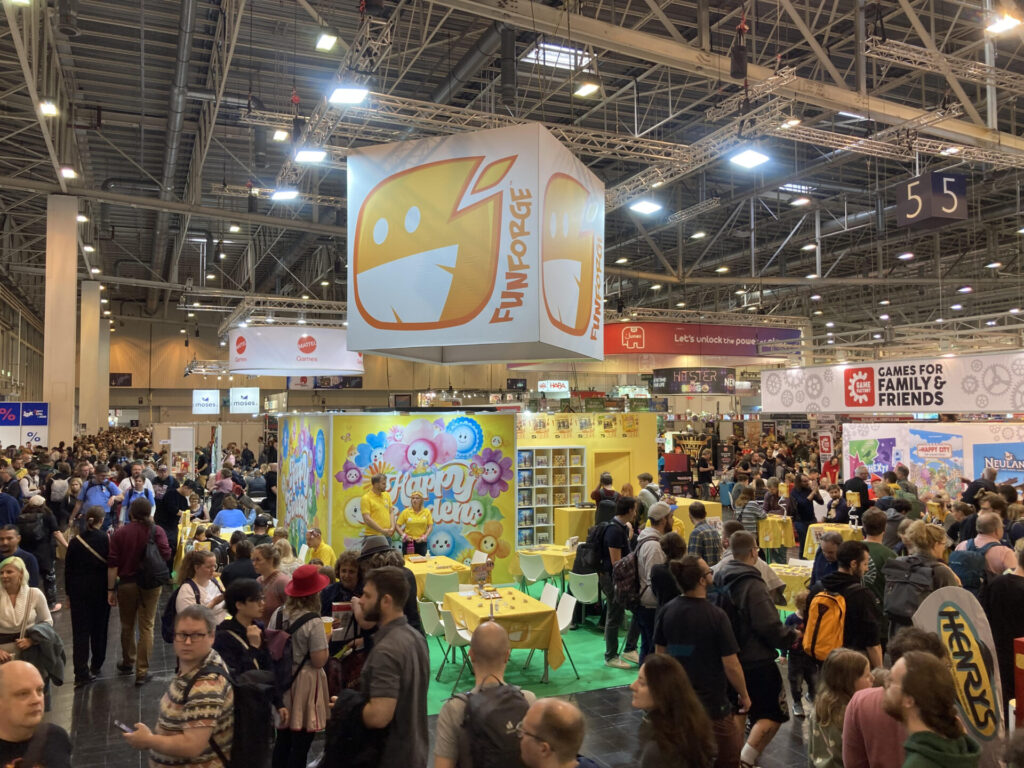
You’ve previously mentioned that you’ve had to make some really hard decisions in terms of cutting the number of staff at the company. Now you’ve gained some capital from Tokaido are you able to rehire and move back closer to where you were in terms of staffing levels?
This is not the plan, you know. We have been hit pretty hard by the situation, so you tend to be super cautious after this. So we don’t want to hire again. The spirit of the company was always to be a bunch of friends/family people. The bonds between us are really tight, you know? I crossed the way of Charlotte, who used to be our communication marketing manager – she’s here, in Essen, because she’s now the head of communication marketing at Blue Orange, and that’s super cool, I’m so happy for her. I’m so happy for them! Because she’s a great value person. And it was really a special moment when we crossed our way again, because there’s a lot of feelings still here, you know, a lot of friendship, in fact.
And so for the moment, I want to rebuild. Also myself – I’ve been hit pretty hard this summer by people who were just nasty. And so at some point you need to rebuild yourself, and to protect yourself – we are all humans. So for the moment, we are team of four. I try to be cautious that the team still remains four and will not shrink anymore, and we will work with people as freelancers, work for hire and to rebuild our communication, marketing and production stuff. We can absorb a lot of work by ourselves, but no, I’m not ready to start again a new team. Plus it will be it might put us again in a too tense situation, financially speaking. The market is really hard right now. It’s really, really hard. So we need to be very cautious with every move we are we are doing.
What are the big challenges over, say, the next six months or 12 months? Not necessarily just for FunForge, but as you say – there are problems for many publishers within this market at the moment.
Wow, that’s something I’m thinking about for a long time. I think that a lot of the global business model is sick right now in the industry. I’ve already talked to you about my feelings about the crowdfunding model, but also regular distribution seems to be – not broken, but it sits on a 30-year-old business model. At some point we need to change some paradigm in the status quo. There’s a huge status quo which led to what the industry is today, which is an overcrowded industry with too many products, good or bad, whatever – there’s too many products. The visibility is extremely hard to have, and putting the light on one of your products requires so much effort compared to before, that it’s really hard.
And the distributors are lost in the all the games that are everywhere – plus they are not really doing their job fully, I mean the way publishers are looking at how distributors should do their job. Most of the time distributors are acting as logistics facility, and when you are a publisher and you are giving margin points to your distributor, you are waiting for them to do some actions – even though you know that you have to do your communication, your marketing and your actions. So I think that something needs to be changed in the in the business model – and this is also a work of the publishers. We need to work closer to the distributor, and to find ways to really work together, because nowadays, my feeling is that there are publishers on one side, distributors on the other side. Everyone wants their share of the market, and the discussions are only about, ‘I want my margin’. ‘No, I want mine’. ‘I want mine’, you know. And so we are all just trying to keep as many margin points as we can.
I start to think differently and being a bit more open, maybe investing more money, more time, being more creative in the way we will promote the products. And this can be done only with distributors, along with distributors. I already had this discussion with some distribution partners here, and they are quite happy when they hear this kind of stuff, because of course, they’re open to do things. We are all in the same boat, you know, we all want to sell games. So, to me, the main challenges for the next six months – in fact for the next 36 months – will be to change the paradigm of distribution in the industry. This is the only way to avoid the crisis. We all feel right now that there will be a crisis. It’s not here, really, fully here, but it’s coming. You know, winter is coming [laughs]. We need to cover up.
Can you speak to any specific examples of things that you’ve discussed with distributors that you think might work, that could make a positive difference?
Well, usually everyone is waiting for the other one to do the work. Most of the time publishers discuss with distributors and say, ‘Why didn’t you do any communication on my game?’ And the distributor says, ‘Because you are in charge of the communication of your game’, and that’s true, in a way, but a lot of time people are mixing up communication, marketing and commercial actions, and I think that we need to clarify the situation. To my mind, the distributors are not in charge of communication and marketing, but they’re in charge of commercial actions, like coupons or whatever. And you cannot just wait for the other one to move. You have to discuss and to co-ordinate your efforts. And this is the kind of stuff that we discussed with distributors. I said I’m ready, not to give margin points, but to put more money on the table, from my side, for an action that we will do all together. So we can coordinate, so at the same time we do this communication campaign, we will do this commercial action on the product on Amazon or the retail stores or whatever – just being a bit more creative and reactive with the distributors. That’s just the entry point, the strict minimum that we have to do. Then afterward, we will think about new ways of doing distribution too. So there is stuff to do between publishers, and responsibilities to be taken also at this point, it’s only the beginning of the way I think.





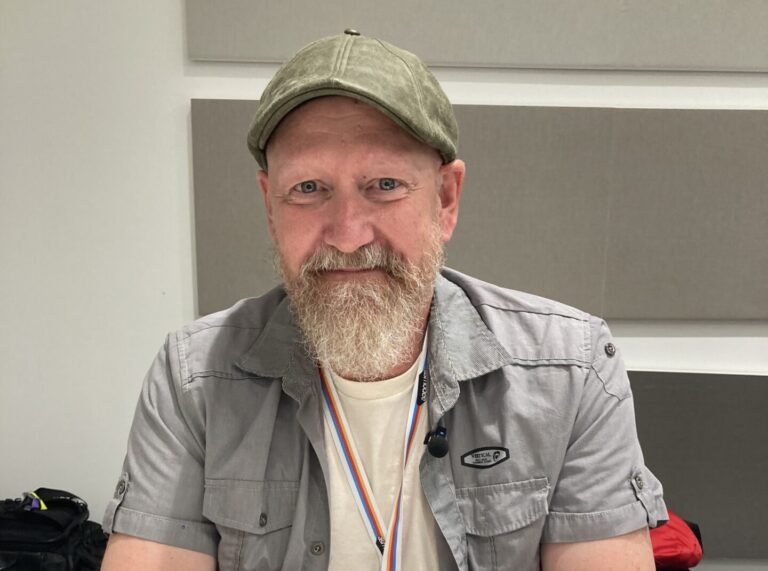
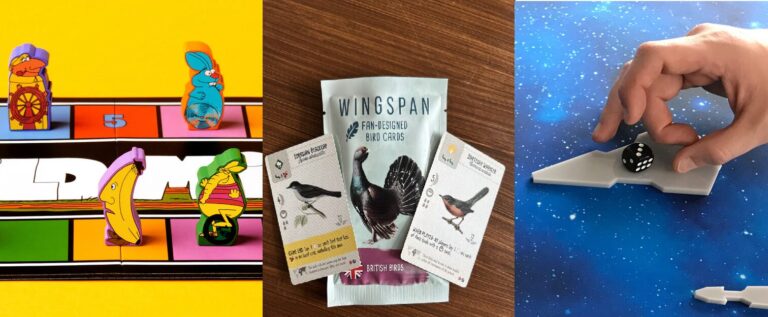
[…] Matagot’s move mirrors that of another French publisher, FunForge, whose CEO Philippe Nouhra told BoardGameWire earlier this month that it had shifted its focus to smaller box, lighter titles as part of its financial recovery from years of struggling to deliver large-scale Kickstarter projec…. […]
[…] “Did it save the company? Yes and no”: FunForge’s CEO on fighting its financial wo… […]
[…] “Did it save the company? Yes and no”: FunForge’s CEO on fighting its financial wo… […]
[…] Stegmaier said 2025 would be “the year of Tokaido” for the company, following its acquisition of the entire line of games from financially troubled French publisher FunForge last October – enabling the latter to rebuild and refocus its business. […]
In fact many backers still haven’t gotten their games (including all UK) and we are in another period of silence from the publisher. Some backers have also received insolvency letters which seem to state that they were listed as creditors by funforge during the insolvency process.
Curious to see how Funforge manages to justify this latest lack of communication (nothing for months). Given how many different dates for delivery backers have been told, I think it is more than understandable that, in absence of any word from the publishers, that they assume the worst. The condescending comments in interviews are also not helping the company’s image.
[…] Stonemaier plans to finish up the year with a new release from an unnamed debut designer, set in the Smoking Bones world created by artist Andrew Bosley, and the company’s version of Namiji following its purchase of the IP and the Tokaido line from FunForge last year. […]